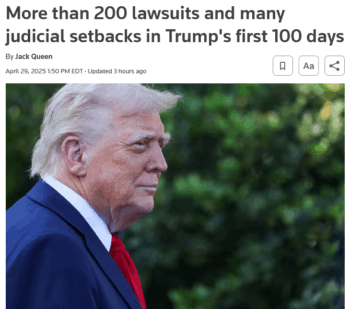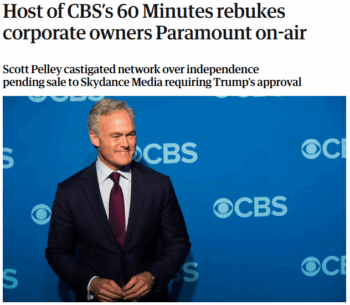Janine Jackson interviewed the Revolving Door Project’s Jeff Hauser about DOGE’s infiltration for the April 25, 2025, episode of CounterSpin. This is a lightly edited transcript.

American Prospect (3/19/25)
Janine Jackson: Trying to keep up with the myriad harms to people and processes coming from the Trump White House is difficult and dispiriting. But piecing out what’s happening from what’s threatened and what’s feared is crucial if we intend to resist. Helping us keep meaningful track of one piece of the work before us—the actions and impacts of the weird shadow power called the Department of Government Efficiency—is new work from our next guest.
Jeff Hauser is the executive director of the Revolving Door Project, where this work is housed. He joins us now by phone. Welcome to CounterSpin, Jeff Hauser.
Jeff Hauser: Thank you for having me.
JJ: Tell us about the scope and the purpose of your work around DOGE, which I can barely bring myself to say. What does that project look like?

Rolling Stone (11/13/24)
JH: So you don’t think that government should be organized around metaphors from cryptocurrency scams?
JJ: Oddly.
JH: Yeah, we at Revolving Door Project tend to agree that that is not how we should organize our government.
We, in general, track corporate influence in politics, with a particular focus on the executive branch. And there has never been a more blatant corporate incursion into the public sector than DOGE, which reflects the privatization of our domestic policy, and increasingly our foreign policy as well, by people who are not even bothering to give up any of their private sector ties, and actually join the government for a few years—which we’re not fans of; we believe in career civil servants. But these people aren’t even doing that much. They’re just continuing to run, say, Tesla and SpaceX while running large swaths of the government, and never having been put before the Senate for nomination.
And so we are tracking what DOGE does, and we will continue to do so, even if we chase Elon Musk physically out of the government, as he scurries back to Tesla, potentially. But we know that he has inserted his people all across the government, and they are doing some of the worst things we’ve ever seen, and the government is breaking as a result. We’re going to track what they do, and who they do it to.

Jeff Hauser: “They are doing some of the worst things we’ve ever seen, and the government is breaking as a result.”
JJ: Well, yeah, because “revolving door,” you think, “Oh, someone, they work for an oil company, then they go work for a regulator, and then they go back to the oil company, and isn’t that a conflict, and isn’t that problematic?” But now the door is a blur. There’s no door there.
JH: There’s just a gaping hole, and they have one foot on one side of the government, and they have one foot in the private sector at the same time, and they have one brain. And so you can bet which side they care about more, which has more meaning to them, the public interest or their private enrichment.
JJ: And part of what I resent is the way it makes you feel quaint for saying, “Well, no, you’re not supposed to make laws and policies based on your own private enrichment.” It makes it seem as though that’s an old-fashioned idea. It didn’t start with Musk, in other words. “If you can run a company, you can run the country” has been a message that we’ve been hearing, unfortunately, for some time.
JH: Oh, sure. I mean, it goes back. Even John F. Kennedy brought Robert McNamara into the government, and he became LBJ’s secretary of Defense, and the Vietnam War was a consequence. And Robert McNamara was actually a pretty serious individual, who ended up becoming reflective upon his many, many sins in government.
But the Whiz Kids of the 1960s, they destroyed America’s credibility across the world. I’m not saying it was perfect before the 1960s, but they did real damage, and they were much more serious people than Musk. So you have less serious people doing something that even the serious people can’t do. This is the result.
JJ: And you pointed out appointments, and I just saw this morning, Shawn Musgrave at the Intercept saying that Musk has now put a Tesla employee as a senior advisor at the FBI. And he’s also going to be at the Justice Department’s Justice Management Division. This is a guy who worked at Tesla. So it’s not just that there’s this weird rogue agency. They’re putting their people everywhere.

Wired (2/12/25)
JH: Yeah, they are increasingly not identifying their people as specifically DOGE, because they’re understanding that that makes them a bit of a legal vulnerability. And so they’re enmeshing their people as advisors and temporary employees in specific departments. But from published reports and from social ties, you can see that random engineers from Palantir, which is Peter Thiel’s panopticon, scary surveillance data-processing company—when you’re seeing all those people from Palantir across the government, whether or not you’ve identified them as DOGE, and we do have a list that we maintain of the people who are identifiably DOGE in the government. But some people who are their peers are now entering government, not exactly as DOGE, but we will monitor them as if they were DOGE, and monitor the privatization of government, and not allow them to change brand names just because the brand of DOGE is bad now and getting worse.

Reuters (4/29/25)
JJ: Right, right. And that’s the importance of the tracking, so that we are not simply overwhelmed and confused by different titles, and by connections that we might not be able to trace, we laypeople who aren’t making it our job, as you are.
The Supreme Court’s ruling blocking deportations without due process was so welcome, and maybe surprising, and we are seeing judges pushing back against some of this in some places. And I just want to ask you, broadly, where do you see meaningful resistance to this phenomenon? Are the courts the place to look for this?
JH: The courts cannot be relied upon on their own, for many reasons, including the makeup of the judiciary, and also just the nature of the judicial role in the United States, which has definitely always been more reluctant to be on the cutting edge of positive social change, then sometimes being a bulwark against positive change, as in the early 20th century.
But it’s still better for the courts and judges to have some self-respect than to not. And so I think what you saw in the seven-judge majority this weekend is seven justices of the Supreme Court standing up for the notion that courts are real, and that when the issues of law are clear, the president doesn’t get to do just what they want just because they won a one-and-a-half percent popular vote plurality. Pushing back against these insults that are coming from Trump, they’re coming explicitly from JD Vance, and are coming from Pam Bondi’s Justice Department. Basically, these justices may not all be committed to doing the right thing for the right reasons, but they do have egos. They do believe in the institution of the judiciary, sometimes because it’s just so enmeshed with their sense of self. I think the courts can be helpful.
But the courts are always going to do a better job if they think they are with the public and that they are speaking up for majorities, and against minorities or authoritarians seeking to grab power. So I think the more demonstrations we see, the more judges will do the right thing, and vice versa. So you can have vicious cycles and you can have virtuous cycles of resistance. And I think the more everyone does their particular job within our shaky democracy, the more likely we come out through the other side relatively OK.
JJ: Let me ask you, finally, about one of the ways that folks understand what the public is doing. If you’re not at the demo, what are you doing? You’re reading about it in the paper.
And I think it’s clear to most by now that the traditional media framing of balancing every Republican claim against a Democratic claim, and the best ideas are going to be right in the middle, that’s not appropriate, to put it mildly. If it ever was, it’s not today. And we have a White House that is promoting chaos, and that’s lying through its teeth. And that is a real challenge to reporters and reporting. And I just wonder, finally, if you think they’re, in general, rising to the occasion, and then what you would like to see.

Guardian (4/28/25)
JH: Sure. I don’t think they’re standing up to the moment, but we do have to recognize that the moment that they face is a very challenging one. I think about the Associated Press being denied full access at the White House because they continue to call the Gulf of Mexico by the name the Gulf of Mexico.
And I’m sure your listeners and readers are well aware of that, but that sort of travesty, just think about it from the economic model of the Associated Press. They need their articles and photographs to be picked up around the world. Their access is a valuable aspect of how they run their organization. At least they are standing up for it.
But then you’re seeing their peer organizations lacking any sort of solidarity. You’re seeing a lot of media organizations that are pursuing mergers for reasons unrelated to Trump, but are bending the knee to Trump because they want approval.
I mean, the scary news about the 60 Minutes executive producer stepping down, that’s worrisome. That doesn’t mean 60 Minutes was a perfect program at any point in time, but that’s a sign that things are going wrong.
What should the media do? They need to take the platitudes they say about the First Amendment seriously. If they’re going to be picked up and embraced by the public as institutions that are worth saving, they need to step up in this moment. This is the moment that you build up those reservoirs of credibility for. And if not now, when? So I’d like to think that they can sacrifice in the short run in order to come out as institutions worth saving, and potentially getting more reader support or viewer support in the future, because people believe in them, and they knew that they stood up when necessary, because right now that’s not happening. They are too fearful.
JJ: Absolutely. I’m going to end on that note for now.
We’ve been speaking with Jeff Hauser of the Revolving Door Project. They’re online right where you’d look for them, RevolvingDoorProject.org. Jeff Hauser, thank you so much for joining us this week on Counter Spin.
JH: It was so much fun. Thanks for having me.
This content originally appeared on FAIR and was authored by Janine Jackson.